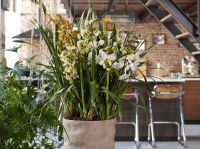
The Cymbidium is known for its striking size and appearance and therefore also referred to as ‘the King of the Orchids’. Its stem is hidden behind a forest of green leaves and its flower stems become rather heavy considering the number of flowers. When flowering, which it does for weeks, the Cymbidium becomes like a torch with pink, red, orange, purple, green, yellow or bicoloured flowers - sometimes paired with a desirable light odour.
Tropical looks, cool character
Unlike most orchids, Cymbidium has root balls rather than aerial roots. Additionally, it’s a strong seasonal plant, only available throughout autumn and winter despite its tropical looks. The plant actually originates from the southern slopes of the Himalayas, where it is used to being exposed to the cold and rocky nutrient-poor soil. In bright light, Cymbidium produces magical and elegant flowers. Needless to say, Cymbidium makes up for a lovely and strong houseplant.
Launch the indoor season with Cymbidium
Cymbidium comes in many colours and petals can be coloured evenly as well as have a pattern: stripes and spots. Cymbidium is a slow grower, it could take up to five years for it to become a flowering plant, making it a strong and long-lasting orchid. The houseplant can be found in mini versions, large-flowered varieties as well as hanging plants. These different versions make it fairly easy to cheerfully display the houseplant.
Tips for looking after Cymbidium
- The Cymbidium does best in a spot with indirect light
- Due to its real root ball, it is recommended to immerse it once a fortnight and leave it to stand for half an hour and allow it to drain.
- Add plant food to the immersion water once every three weeks.
- Cut the flower stem once Cymbidium has finished flowering. Give the plant a light and cool spot, and it’s quite likely that it will produce another stem.

